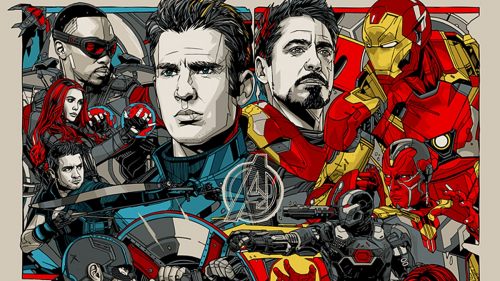About That Phone At The End Of CAPTAIN AMERICA: CIVIL WAR
At the end of Captain America: Civil War Tony Stark gets a package. Inside is a note from Steve Rogers, aka Captain America, aka the guy against whom Tony had found himself fighting at the end of the movie (in possibly the most brutally and emotionally intense moment in the entire Marvel Cinematic Universe). As the movie ends Rogers is a fugitive, and he has relinquished his identity as Captain America along with his shield. Bundled with the note is a phone, with one number programmed in it - Steve’s, so that Tony can get in touch with him should the need ever arise.
Many cried foul. This was a bullshit Marvel happy ending! Couldn’t the Russo Brothers have left the movie on a cliffhanger, much like The Empire Strikes Back, a film that has echoes in this one? Marvel is afraid of leaving one of their movies on a dark note, they need to tie everything up in a bow!
Some of these complaints are weird as they come from the same people who talk about how Marvel movies aren’t complete films, that they exist only to set up the next picture in the meta series. That was bothering you before, but now you’re bothered that this movie isn’t setting up the next movie’s conflict enough? Odd.
Some of these complaints are weird because they seem to forget how The Empire Strikes Back ends. Yes, Han is frozen in carbonite, but Chewie and Lando are on the hunt, and meanwhile Luke and Leia are reunited after Luke’s hand is replaced - his journey towards becoming whole has begun. The ending of Empire is essentially hopeful, and the framing of the last shot - Luke and Leia holding each other, looking out at the vastness of space and then the reveal of the Rebel fleet intact, moving forward - is an image of hope. Things got bad, and the heroes were dealt some blows, but at the end of the movie they are there for each other and the message is that it’s all going to be okay.
But mostly these complaints are weird because they represent what is, to me, a juvenile view of the conflict between these two (child-oriented comic book) characters. It’s the kind of grim and gritty view of conflict that, frankly, led us to Batman v Superman, and it ignores the larger reality that underscores everything happening in Civil War: these guys like each other, and these guys are both good people under it all. That’s why their final fight is meaningful.
Sending that phone is the most Captain America thing Steve Rogers could have done; if you were being unkind you could even consider it condescending in that special way that Captain America sometimes is (he calls everybody ‘son’ all the time in comics). If you were being unkind you could see this as Steve going out of his way to show that he’s the bigger man, that he’s willing to put the whole thing behind him and all that jazz. If you were being unkind this gesture could actually be super fucking annoying.
I am not willing to be unkind about the motivations of Captain America. Yeah, he can be a little condescending but my man is Captain America, and maybe he’s just keeping it real, what with him being a 97 year old hero of WWII. In fact, I think that Cap sending the phone is a moment of immense humility - this is how he is apologizing to Tony Stark. And I think it’s a moment of maturity that’s kind of inspiring in its own way.
Remember, shit got harsh at the end of Civil War. The fight between Tony and Steve was nasty and unpleasant - the moment where Steve lifts his shield over Stark and Tony reacts like he thinks his friend is going to KILL HIM says a lot. This is a big deal for these heroes - again, this isn’t BvS where one of the heroes murdering the other is a given, it’s the MCU, where these guys hang out together and have parties. The fight at the end of the movie has a lot of emotional heft to it, underscored by Stark telling Cap that he doesn’t deserve the shield, the shield his dad made.
That’s a great callback to years of Tony Stark’s daddy issues, which have played out obliquely against his friendship with Cap, who was his dad’s favorite son (keep in mind that Howard Stark helped ‘create’ Captain America; Tony's rivalry with Steve is semi-sibling in nature). More than that, it’s the moment where Stark claims his father for himself, a claim he can make because of the revelation that Cap has known the truth about Howard's death since the events of The Winter Soldier and kept them from Tony.
Here’s where I want to bring it back around to the phone. Steve’s sin isn’t supporting Bucky (although in the moment that was the source of friction). Steve’s sin was keeping a secret from Stark, and if Steve had previously told Tony any part of the truth - like at any time in the last three years, as the MCU occurs in real time - he might have had a bit of moral high ground in that last scene. He might have been able to talk sense to Tony in that moment, rather than have Stark go full (understandable) rage-out.
What we have here, as Guns n’ Roses sampled in their song Civil War, is a failure to communicate.
Steve never meaningfully apologizes in the moment to Tony for keeping the secret, and he never really acknowledges that his lack of communication is to blame for what’s happening there in the missile silo. But by sending a phone, Steve is actively working to rectify that mistake - he’s ensuring that even when they’re estranged there will be a line of communication between them. And that’s just the personal level; Steve knows that should there be a secret threat against the world (as I am sure is heading our way in a future Avengers film), he needs to be on call, even if it jeopardizes his freedom.
For me the phone is a statement that Steve Rogers is a man of immense maturity and wisdom, and that maturity and wisdom allows him to take steps to make amends and accept responsibility for his failings. That’s inspiring for me, and isn’t that what heroes should be doing - inspiring us? In heroic fiction our characters are tested and usually overcome all odds, but I think it’s just as important to show how they overcome their own failures. In Captain America: The First Avenger we saw that Steve Rogers always had the decency and heroism that made him a superhero, even before his body caught up with his spirit. At the end of Civil War we see that, even stripped of the costume and the shield, even after he fucks up pretty royally, Steve Rogers still has that decency and heroism.
It’s just like the ending of Empire Strikes Back. Things got bad. The bad guy won. Our heroes are scattered and wounded. Hell, one of them is frozen. But there’s still hope, and that hope comes from the heroes themselves - they refuse to be beaten, they refuse to let the defeat define them. To end Civil War with Tony and Steve still hating each other, still at that level of violent disagreement, would be untrue to the characters, to their basic heroism.
So I get it if you don’t like the phone showing up at the end of the movie. I wouldn’t want the film to end any other way, and I don’t think the presence of the phone means Tony and Steve’s next meeting will be without friction. It isn’t like the same guys who wrote and directed this movie won’t be writing and directing their next meeting. But in the meantime I go to superhero movies to see heroes succeed, even as they fail. Captain America fucked up, but he’s working to make it right, and that’s just as heroic as saving the day.



